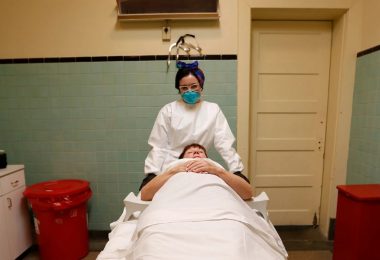
Orthopedic Surgeons specialize in injuries and disorders linked to the musculoskeletal system, and their job will include surgery, diagnosis, and rehabilitation. Some orthopedists specialize in oncology, trauma injuries, sports medicine, pediatrics, or reconstructive surgery. Generous compensation, packages, and job openings await students who are willing to spend fourteen or more years in education and training to become orthopedic surgeons.
Orthopedic Surgeon Job Description
Every day brings a new challenge to an orthopedic surgeon. The orthopedic doctor’s job description includes ordering diagnostic tests, meeting with patients, ordering physical therapy, prescribing medication, performing surgery, and setting fractured bones. An orthopedic surgeon works in a hospital and clinical settings. Even before meeting a patient, an orthopedic surgeon reviews the patient’s relevant information and medical history.
Apart from ordering tests, and using the findings to determine the diagnosis, an orthopedic surgeon examines a patient. An orthopedic surgeon’s responsibilities include performing surgery on a torn ligament or noninvasive procedures such as immobilizing a fractured bone.
An orthopedic surgeon prescribes physical therapy when necessary and ensures that a plan for postoperative care is in place after surgery. Besides having medical responsibilities, an orthopedic surgeon supervises other staff. Some orthopedic surgeons engage in continuing research and educate medical interns.
How Much Can You Really Earn as a Surgeon?
A Complete Guide on How to Become a Surgeon?
Education Requirements
If you aspire to become an orthopedic surgeon, earning a pre-med or an undergraduate degree in chemistry, biology, will provide an excellent start. For you to be considered a serious applicant when applying to medical school, it is essential to graduate with a high-grade point average.
In medical school, you will also gain clinical experience, and you will take 4 years of classes. Courses include topics such as physiology and anatomy, immunology, histology, and pharmacology. An orthopedist starts with attaining an undergraduate degree in one of the hard sciences, chemistry, physics, or pre-med.
After completing pre-med, a student will attend medical college, which includes classes such as physiology and anatomy, patient care, biochemistry, immunology, genetics, pharmacology, and neuroanatomy. Clinical rotations will provide perspective about specialty areas such as psychiatry, pediatrics, obstetrics, orthopedics, and general surgery, gynecology, and oncology. After you graduate, you will spend 5 years in a residency program in orthopedic surgery. As a resident, you will practice and learn orthopedic surgical techniques. If you are planning to specialize further, you may spend an additional year in an orthopedic fellowship program.
Industry
A benefit of spending fourteen years or more training to become an orthopedic surgeon is the expected compensation package. The orthopedic surgeon’s salary is over $450,000. Specialists can make $750,000 or excess.
Years of Experience
The career description for an orthopedic doctor is that it requires a high level of experience and training. Apart from undergoing fourteen years of training and education, orthopedic surgeons build a reputation for excellence. Patients seek experts who have a track record of success. After being in the field for several years, some orthopedists take on leadership roles in a hospital or clinic or teach in medical school.
How Much Do Orthopedic Surgeons Make
Orthopedic surgeons earned a median annual compensation of $487,650 as of May 2020, which means that half make more than this, and half make less. This is higher than the median annual pay of all surgeons and physicians, which is $208,000, as of 2019. The top ten percent of orthopedic surgeons earn more than $570,000, while the bottom ten percent earns less than $120,000.
As with many occupations, the number of years of experience on the job affects orthopedic surgeons’ compensation. The geography, sub-specialty, and the employer can also affect salary. One projection looks like this:
- Entry-Level: $101,160 – $517,110
- Mid-Career: $118,493 – $564,760
- Experienced: $126,646 – $595,114
- Late-Career: $196,939 – $699,216
Careers in Europe: An early career Orthopedic Surgeon with 1-5 years of experience makes an average total compensation (includes bonus, tips, and overtime pay) of €84,500 (Germany). A mid-career Orthopedic Surgeon with 5-10 years of experience earns an average total compensation of €90,000. An experienced Orthopedic Surgeon with 10-20 years of experience earns an average total compensation of €120,000.
Careers in Asia: An early career Orthopedic Surgeon with 1-5 years of experience makes an average total remuneration (includes bonuses, tips, and overtime pay) of RM 360,000 (Malaysia). A mid-career Orthopedic Surgeon with 5-10 years of experience makes an average total remuneration of RM 508,682. In their late-career (20 years and higher), employees make an average total compensation of RM 480,000.
Job Growth Trend
Orthopedic surgeons are most sought after; as the population continues to age, orthopedic surgeons’ requirement increases. You can expect a twenty-percent increase in orthopedic surgeon job openings between now and 2025.(1)




